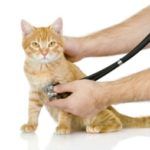Blog Layout
Why Does My Cat Need An Annual Examination?
Rebecca Schmidt • Aug 28, 2015
An annual or semi-annual examination for your cat is one of the most important things you can do to ensure your cat has a long, healthy, and happy life. Semi-annual examinations are especially important for senior cats (8 years and older) because what may appear to be signs of old age can actually be signs of underlying disease that can be very treatable. During these examinations your veterinarian is able to catch subtle issues before they become serious or possibly life threatening problems.
A very important problem that is often missed by owners and caught by veterinarians is dental disease. Plaque, tartar, and inflammation of the gums is very common in 80% or more of cats by age 3. Inflammation of the gum tissue, which is called gingivitis, acts like an open wound in the mouth that allows bacteria into the blood stream. This bacteria needs to be filtered out by the kidneys, liver, and heart which can lead to organ damage.
Cats have a survival instinct which causes them to mask or hide their pain and illness. When a cat is sick or injured they are considered weak and vulnerable for attack by larger prey. Whether your cat is an indoor or outdoor cat, all cats have the same instinct. This is why annual, semi-annual, and dental examinations are so important for your cat.
Here is what most veterinarians check during an examination:
- Skin for any lesions, growths, and abnormal bumps
- Weight
- Eyes and ears for inflammation, drainage, and infection
- Fur for condition of coat, fleas, and lack of grooming
- Lungs for abnormalities and congestion
- Abdomen is palpated for sensitivity and pain
- Heart for abnormal sounds and irregular rhythm
- A rectal exam for signs of infection or impacted anal glands
- Nose for drainage or congestion
- Teeth, mouth, and gums for tooth decay and disease
BROWSE OUR WEBSITE
CONTACT INFORMATION
Phone:
847-680-1770
Fax:
847-680-1775
Address:
295 Peterson Road
Libertyville, IL 60048
Business Hours:
- Monday
- Closed
- Tue - Fri
- -
- Sat - Sun
- Closed
Content, including images, displayed on this website is protected by copyright laws. Downloading, republication, retransmission or reproduction of content on this website is strictly prohibited. Terms of Use
| Privacy Policy




